Jazz. When you hear the word, what names pop into your head? Louis Armstrong? Thelonious Monk? Jelly Roll Morton? Ella Fitzgerald? What about Buddy Bolden? That’s right. King Buddy Bolden, the first king of New Orleans music. A relatively unknown figure, there are no recordings of Bolden and his cornet but for possibly one phonograph cylinder which remains lost, a smattering of photographs, and little written on the man. He is, however, credited by the early jazz musicians as the man who invented jazz and who contributed much to the musical art form with his fusion style of brass and blues and improvisation playing by ear. At his performance peak from 1900-1907, in 1907 he was placed in an asylum where he remained until his death in 1931.
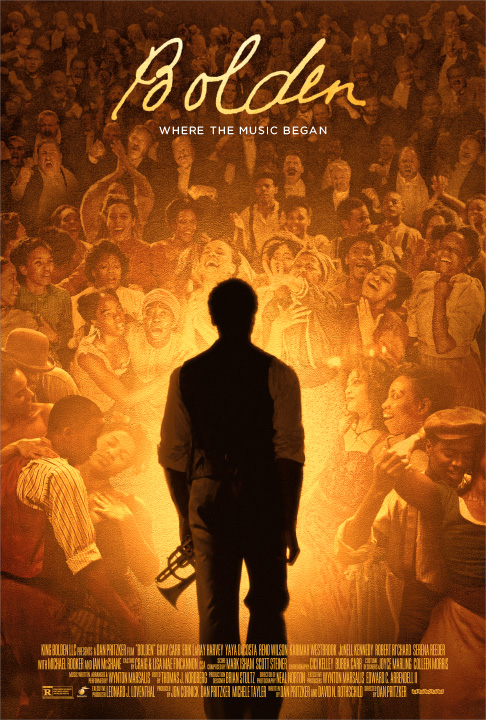
With that historical background information, writer/director Dan Pritzker then crafts a mythological story taking us into the world of Buddy Bolden with BOLDEN. Setting the stage with Bolden already in the asylum, he hears a radio broadcast of Louis Armstrong which then takes Bolden back through his own life and his days as “King Bolden.” That radio broadcast, of which there was one with Armstrong only five days before Bolden’s death, serves as the entre into Buddy Bolden’s story. Might Bolden have actually heard that broadcast? Who knows. But it’s possible that a nurse or attendant may have had the radio on for the music to calm the patients. Taking the lead from this story set-up and the allegory of the film as a whole, Pritzker then creates a glorious visual triptych construct with cinematographer Neal Norton and then compounds the visual beauty with the musical compositions of Wynton Marsalis, and then casts Gary Carr as Buddy Bolden and, most notably, RENO WILSON as Satchmo himself, Louis Armstrong.
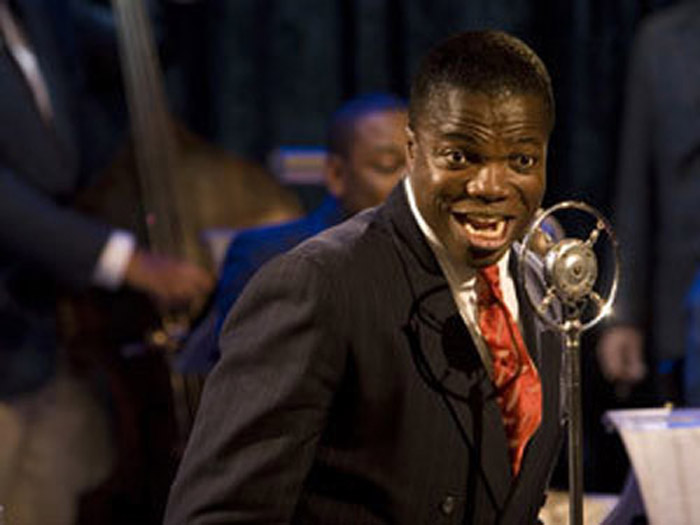
Wilson, probably best known to many as “Brains” in the “Transformers” franchise or as “Officer Carl” in “Mike & Molly” or from any one of his voicing characters on film and for video games or his numerous television series, is also a very talented singer and musician. He is also obsessed with Louis Armstrong, so much so that he has been working on bringing Armstrong’s story to the stage with himself as Armstrong. So in sync with Louis Armstrong and so very much wanting this role in BOLDEN, Wilson showed up in character and costume to his audition, a moment that fully defined the character for director Pritzker and clinched the role of Louis Armstong for RENO WILSON.
When we first meet Armstrong in BOLDEN, he is on stage in a lakeside ballroom with his band getting ready to air live on the radio. Inside the ballroom, the wealthy white crowd applauds while outside in the humid Indian summer air the black crowd cheers and screams. The night is inky blue filled with stars while the ballroom glistens with lights and the reflection of Armstrong’s trumpet against the saturated and bright colors, filled with deep turquoises, while white bandstands and tablecloths allow Armstrong’s cornet to glisten even brighter. Armstrong’s omnipresent white handkerchief is in his hand as he brings the trumpet to his lips. His energy is high. the crowds enthusiastic. And off he goes. Wilson is transformative. He IS Louis Armstrong. From look to movement to voice to cadence and to, most importantly, musicality. What Rami Malek did as Freddie Mercury, Reno Wilson does as Louis Armstrong.
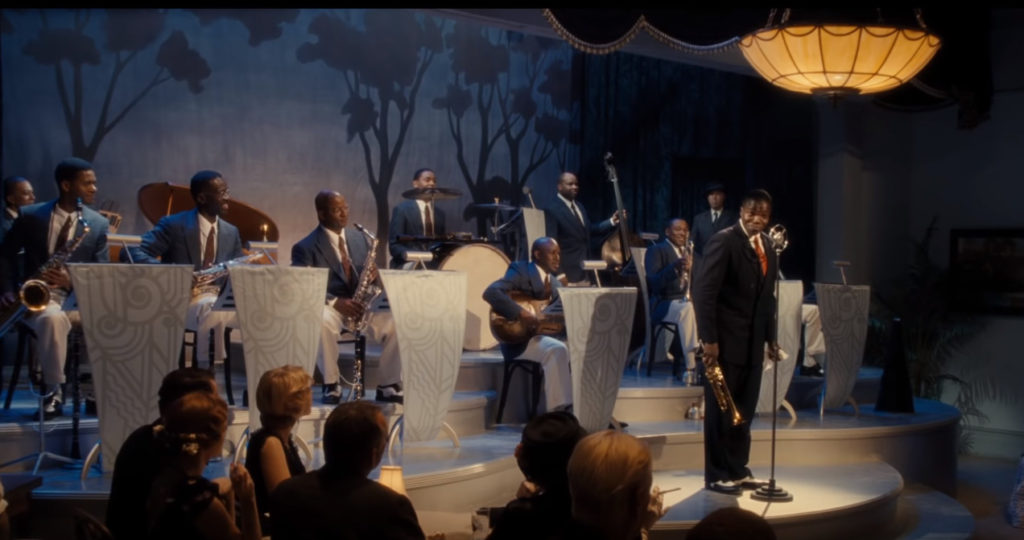
Speaking with Reno about BOLDEN, his energy is off the charts, his admiration for Louis Armstrong is undeniable, his passion for the craft of acting and music unparalleled. Although we spoke over the phone, you could hear his smile, especially when he started singing “High Society, High Society. . .” which is what Armstrong sang in “High Society” with Frank Sinatra and Bing Crosby. A man born of the blues with a beat in his heart (his mother sand in the chorus of the Metropolitan Opera and his father was a blues musician), thanks to his performance as Louis Armstrong in BOLDEN, RENO WILSON is really living his dream.
Take a look. . . .

Reno! What. A. Performance. As Louis Armstrong. Wow! I felt like I was watching Satchmo himself!
Thank you. That’s the goal.
I was just talking to Dan [ Pritzker], and I told him that as I watched your performance, I noticed you even had your finger placement like Armstrong’s. He would straighten out his fingers as opposed to keeping them arched and just bring down the fleshy part between the first and second knuckle onto the finger buttons. And that was fresh in my mind as I had just watched “High Society” over the weekend.
[breaking into song] High society, high society, yeah… Exactly! You picked that up! Thank you for noticing that. I’m very proud of that. That right there, I honestly am most proud of, that I learned to play the trumpet, learned to play the songs just like he did.
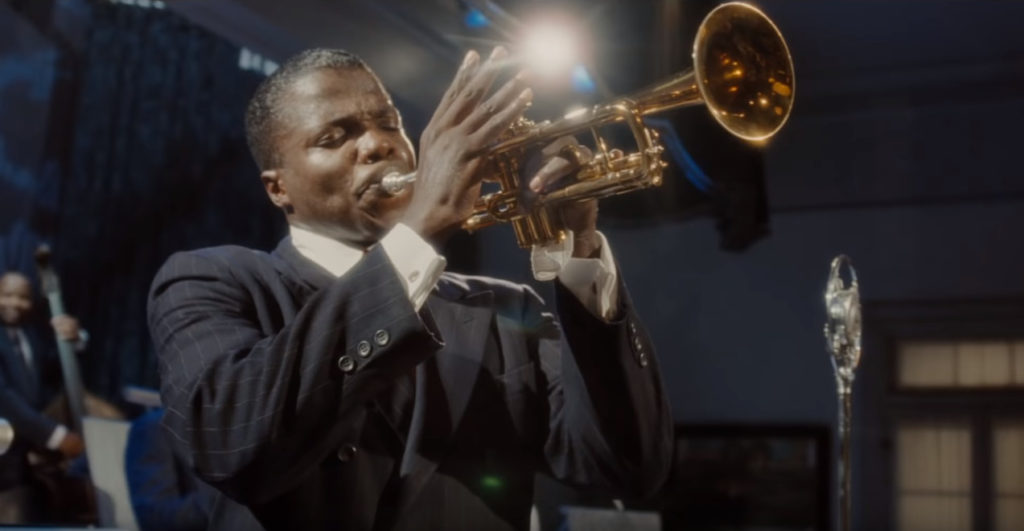
That is the first thing I noticed and on seeing that, I went, “Okay. I’m in for a ride watching Reno as Armstrong!”
Thank you. Thank you.
For you as an actor, this had to be an extremely daunting project; to see a script like this come to you, and you sit there and go, “Louis Armstrong. He is an American icon.”
Right, yeah. For me, I was really fortunate because prior to getting the scripts to BOLDEN, I was working on my own live show about Louis Armstrong. So, Debbie, it’s one of those things that doesn’t happen in Hollywood. I get a script, I open it, and the first character I see is Louis Armstrong, and literally while I had the script, I was holding a trumpet and a handkerchief in my hand. So I was already in the space. It was crazy.
That’s it. The movie gods are saying, “Reno, you must do this.” Obviously, you had been doing research on Louie Armstrong for your stage production. But did you know anything at all about Buddy Bolden?
No. No. Not at all. And when I went to research who he was, there wasn’t really anything about him. There’s not much there. I think there’s like two books that might have been. One is kind of biographical and the other one is just like musings on what Buddy Bolden must’ve been like. Sometimes I think about what we lost when they put him in that insane asylum. What could’ve happened. But the beauty is, he was the spark that inspired a young Louis Armstrong. You know? And we wouldn’t have any modern music without Louis or, or without Bolden there would’ve been no Louis.
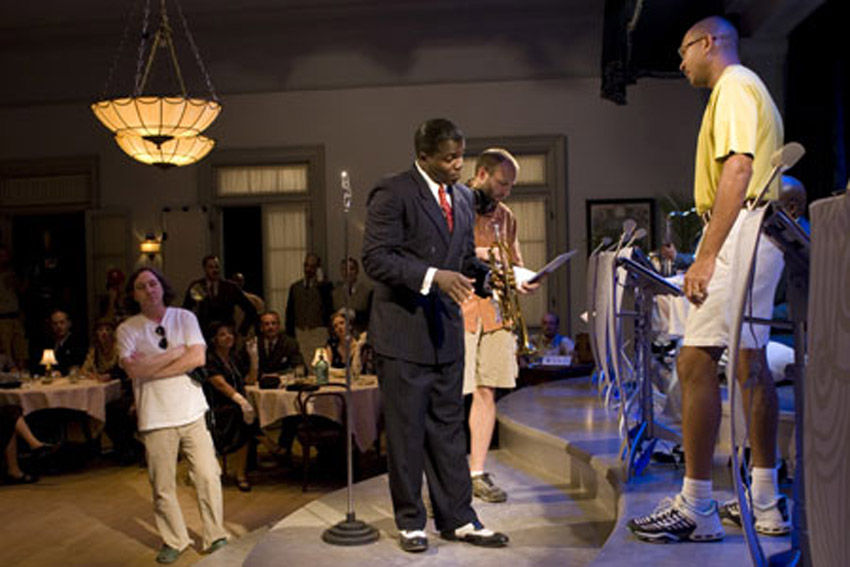
Now, had you seen Dan’s film, “Louis”? And just the brief Buddy Bolden in there that Anthony Mackie played?
About young Louis getting his own trumpet? Oh, of course. Yeah, I’ve been part of this process since the beginning, yeah.
I was just curious because I know that Dan had shot the whole first version of BOLDEN and wasn’t happy with it. And I was excited when I first saw “Louis”, because BOLDEN was allegedly coming up next, and I was like, “Oh my god, this is great.”
Right. He shot the silent film simultaneously while he was doing the first incarnation of BOLDEN. He [Pritzker] is a unique individual.
You’ve been in some of the hugest blockbusters in cinema’s history. You’ve done television. You step into a film like this that hopefully is going to open up the eyes of a lot of people and expand their musical and historical knowledge. You’ve got a 300-theater opening on the third. What is it that attracts you to projects like this? You very easily could just sit and be content with doing voicing in “Star Wars”, voicing in “Transformers”, being on hit TV shows like “Mike & Molly” or, even earlier in your career, “The Cosby Show.” What is it that attracts you to something like BOLDEN?
Well, obviously it’s Louis, right? And it’s the music, and it’s the uniqueness of this story. Think about it. He was unrecorded, there’s one faded picture of him, yet somebody did a movie about him. That’s how huge of an impact he had on human beings. I can’t wait for people to see this movie.
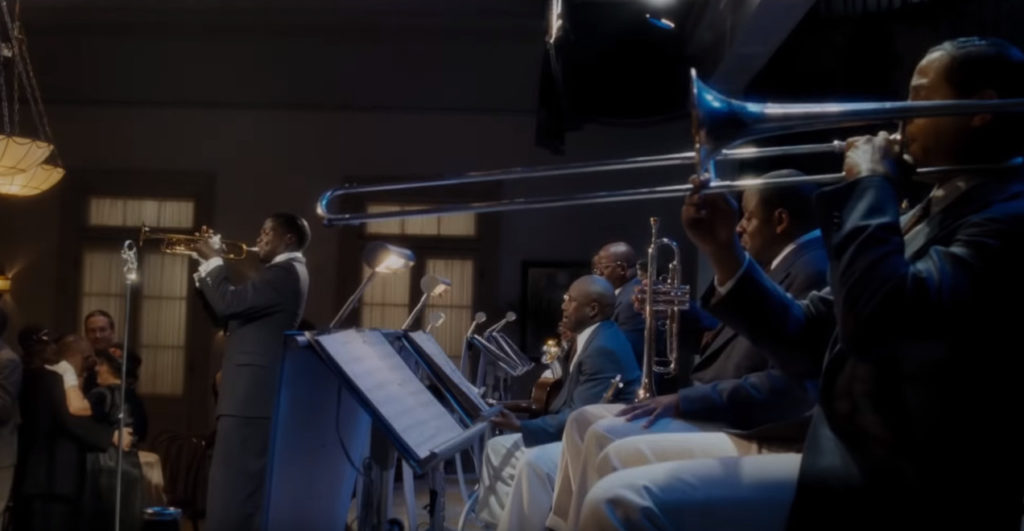
Because you have done so many different types of films and TV series, what were your thoughts when you saw how Dan structured this, and what he did visually? Breaking this up into a visual triptych where Louis Armstrong gets to be in vibrant, living technicolor, and then we’ve got poor Gary Carr’s Buddy in an insane asylum with black and dark green, and then, of course, Buddy’s memories are just sepia and faded to white and just gorgeous. It’s all so beautiful, beautiful to watch, but so horrible. This is not something that you come across every day in a film.
Dan is like this crazy man. He’s a musician, and he’s so connected to the music. I think that’s his way in, but you can tell that he loves art as well as the visuals and the people that he pulled in to work on this movie. There’s a scene that didn’t make this cut, but it was Louis Armstrong in his dressing room. And I’m a guy who has studied almost everything there is about Louis Armstrong, so at his table, they literally – Debbie, everything that is on this desk is authentic. From the red beans and rice to the letter that was in the typewriter, that was in the joint. So Dan did his work, and he’s hired the best of the best to work on this movie.
Wow! As Louis Armstrong, you get to be decked out in a tux and spats and dressed to the nines. It’s slightly different than some of the other roles that you’ve had. How important is the costume and setting for you as an actor, particularly in this role, for setting the tone, setting the stage for you?
I love that question. So many people don’t ask that. That’s a great, sensitive question. I love wardrobe fitting! I love to go to a fitting ’cause that’s when you literally get to put on the skin, if you will, of your character, right? The shoes, and particularly for this movie, the suits that I was wearing, the heavy wool of them old suits, them old. . . They got some vintage suits and it informs everything. The horn I was playing was a 1929 Selmer. So it just informs everything, ’cause you almost don’t have to act, you just have to kinda breathe and let it all come through you.

How important was it for you in taking this role, that Dan is not only the writer and director but is also a musician. I cannot see this film being made by somebody who does not have a musicality to them.
Yeah. Definitely a musicality, but he has a love for Louis, for Bolden, for the period.
Has he made you have a greater love by doing this movie, than you already had?
Yeah, yeah, man! It’s just like I told him when I was on the set, it was like I was in that show “Quantum Leap” with Scott Bakula. It was like I just jumped right into Louis Armstrong’s skin. I looked into the mirror and I was like, “Holy shit. I’m here.”
How long did you actually shoot the parts of Louis?
A week. I literally recorded the songs and shot the scenes in a week. Like five days.
I know you sang. You did all your own singing, so I’m curious. Did you pre-record the vocals and then lip-sync, or did you sing live?
I did sing. We recorded it, and then I sang live, but what you’re hearing in the film is the recording. I’m singing live tomorrow, though. Tomorrow is the Gala Jazz at Lincoln Center, and I’m playing with Wynton Marsalis. But they’ve got a whole host of incredible artists: Dianne Reeves, Harry Connick, Jr., and Noah Halpern, and Jon Baptiste. It’s about to get crazy tomorrow.
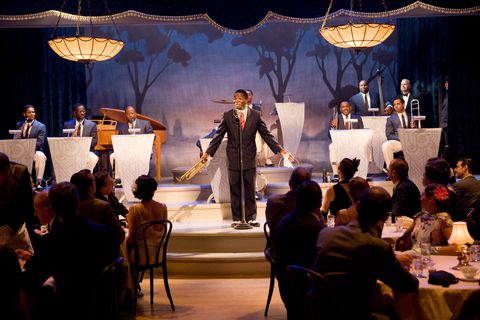
Did you ever think at this stage in your career, that this is where you’d be, and that you would be front and center with names like that at a Lincoln Center gala?
No, and what’s more prophetic and really beautiful for me, is [that] my mom was an opera singer, and she sang at the Metropolitan Opera. She was in the chorus. And my dad was a blues musician. He’s a blues organist and had a stroke while he was performing when I was four years old. My dad, according to my sisters, was a huge Louis Armstrong fan. So, to be here tomorrow, doing that, is kind of emotional.
How are you gonna get through the song thinking about your mom and dad?
It’s an upbeat song. It’s an upbeat song, so it’s not black and blue.
What is the greatest gift that acting, and now musical performance, gives to you?
Just an opportunity to express all of that energy that’s inside of me, to have an opportunity to get rid of it. And to kind of be of service to somebody. If you believe, if people believe that I’m into it, the audience is into it, and it’s a real good thing. Takes people on a journey, and kinda be private in public, you know what I mean? That’s the gift for me.
Is there a story out there that you want to tell?
Again, I am still working on the stage version of the Louis Armstrong story, so this is like a piece of what I want to do, not the whole thing. But there’s that, and I’m kinda living that right now. So I’m sayin’ this is kind of a dream role.
by debbie elias, exclusive interview 04/16/2019












